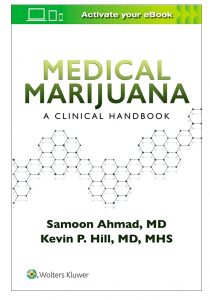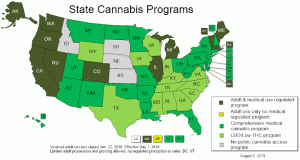The book’s authors, Samoon Ahmad, MD, of NYU Grossman School of Medicine, and Kevin Hill, MD, of Harvard Medical School, have written this textbook primarily to educate healthcare and wellness professionals about the clinical applications of cannabis.
If you wish to re-publish this story please do so with following accreditation
AUTHOR: Heather Allman
PUBLISHER: CANNABIS LAW REPORT
Interview with Dr. Samoon Ahmad, Co-Author of Medical Marijuana: A Clinical Handbook, Published in September 2020
The book’s authors, Samoon Ahmad, MD, of NYU Grossman School of Medicine, and Kevin Hill, MD, of Harvard Medical School, have written this textbook primarily to educate healthcare and wellness professionals about the clinical applications of cannabis.
Many clinicians are unaware of the advances that have been made in the study of how cannabis affects the body’s endocannabinoid system, a vast network of receptors and ligands that extends throughout the entire body and is integral to the function of both the central nervous system and the immune system, largely because it is still a nascent field of study.
In fact, some older physicians do not even know about its existence because it was only discovered in the 1990s and was rarely even mentioned in most medical textbooks published before 2000.
Though the book was written primarily for clinicians like themselves, the book is also accessible to patients and the general public, and it is an invaluable resource that offers a balanced and evidence-based examination of the benefits and risks of cannabis-based medications.
By focusing solely on the science of the plant and how it interacts with the body, the book attempts to remove the political and cultural lenses that have far too often distorted perceptions about cannabis. The book has been well received and reviewed by luminaries in the medical and cannabis industries.
On September 29, 2020, I had an insightful interview with Dr. Samoon Ahmad of NYU Grossman School of Medicine, and co-author of the newly published title, Medical Marijuana: A Clinical Handbook.
Here’s our discussion about the dire need for credible cannabis education not only for clinicians, but also for discerning patients.
Cannabis Law Report: Why do you love your work? There are quite a few fast-growing markets currently, so why cannabis?
Dr. Samoon Ahmad: “There are two countervailing issues that drew me to cannabis.
The first issue is that there is an immense amount of interest about it. There is a constant drumbeat about it in the mainstream press whether it is because another state has decided to decriminalize possession of marijuana or because some celebrity is now selling gummies containing cannabidiol (CBD).
The second issue is that a lot of people, even a lot of clinicians, are not knowledgeable about cannabis. This includes its history, its basic constituents, and its potential therapeutic effects.
This has led to a problem: While there is a surge in public interest and cannabis use, researchers and clinicians have not had the chance to keep up in terms of studying its potential benefits and adverse effects with randomized control trials.
Perhaps even more problematic is the fact that the general public’s views about cannabis are shaped more by their politics rather than research and scientific data.
One camp believes that it can treat anything while the other side claims that it is the first step towards a life of drug addiction.“
CLR: Why specifically do you think Medical Marijuana: A Clinical Handbook needed to be written?
Dr. Samoon Ahmad: “Kevin and I felt we needed to address this knowledge gap.
We did not learn a great deal about cannabis during medical school, and the political debate about marijuana has cast such a long shadow over the scientific study of cannabis that it has made it difficult to fully separate fact from fiction.
Some clinicians view it as either harmless or a panacea, and see no problem recommending it for a laundry list of conditions. Others would never dream of bringing up the subject with their patients and strongly discourage its use.
Then there is a rather large group in the center who are not totally opposed to its use, but do not feel confident in their knowledge.
It’s become such a divisive issue that clinicians don’t know who to trust; hence, they avoid the topic entirely even if some of their patients could be helped by it.
Patients are starving for information on the subject and clinicians should be able to offer them guidance.
If the medical community is unable to come together and educate the public, it is very likely that patients will go online and read an article that could be riddled with misinformation, and this is potentially dangerous.
Clinicians should be able to convey the benefits and risks before recommending it to patients, and then be willing to act accordingly.”
CLR: Tell me about your year to date, expanding on Medical Marijuana: A Clinical Handbook, 2020, and your place in the national cannabis landscape?
Dr. Samoon Ahmad: “2020 has been an interesting year for a variety of reasons—especially the COVID-19 pandemic, which has interfered with a lot of plans.
However, with respect to the book, we were able to maintain a schedule with the publisher and we are continuing to accumulate new information about cannabis— from changes in state regulations to new studies—that is regularly published on the book’s website, cannabistextbook.com.
It’s essentially a living document that is more adept at tracking the rapid pace of cannabis research.
Rather than trying to publish new editions of the book every few months, we will continue to put new information on the site and later incorporate it into the next edition. This includes any clinical or legislative news.
It will also update clinicians on cannabis regulations, which are also changing rapidly, in some cases by the week.
As for the national cannabis landscape, we’re hoping to be the sticklers for unbiased scientific data rather than participants in the political debate for or against medicinal use.
Our hope is to educate clinicians and the public so that policies that impact cannabis research are based on unbiased medical science rather that political opinions.” CLR: What was your personal intention initially jumping into the medical cannabis book space, first as researchers, then as authors?
CLR: What was your personal intention initially jumping into the medical cannabis book space, first as researchers, then as authors?
Dr. Samoon Ahmad: “My first goal was to better educate my colleagues. Over time that goal has expanded, and I realized the importance of also educating the general public.
Though the book is written in a scientific and clinical manner that speaks directly to clinicians, it is not solely written for people with medical backgrounds.
Moreover, patients will be able to comprehend the vast majority of the information, since it is written in easy to understand language.”
CLR: How do your past professional experiences and successes help you today in the modern cannabis space as authors?
Dr. Samoon Ahmad: “My professional experience has kept me grounded and levelheaded. Working at an inner-city public hospital in New York City for almost 30 years, upwards of 70 to 80 percent of those whom I treat with severe and persistent mental illnesses have comorbid substance use disorders.
That was the lens through which I viewed cannabis use for a long time. Yes, I knew that it could help treat symptoms associated with terminal illnesses like cancer, but my experience with cannabis was mostly as a drug that was heavily abused.
Conversely, I was seeing a rise in the number of patients in my private practice who used marijuana or CBD regularly, and they said it helped them to relax or to reduce anxiety or to treat certain kinds of pain.
It did not hurt their professional careers and it did not lead them to use other drugs or exhibit aberrant behavior.
These are the lessons that have shaped my opinion and thinking over the years.
It goes without saying that there are inherent risks associated with its use and we need to evaluate patients to weigh benefits versus adverse effects, but to reach that goal we first need to have a basic understanding of the cannabis plant which requires rigorously studying it in randomized double blind control trials.
The more we understand the impact of cannabis on the endocannabinoid system, the better we will be able to use it to treat conditions like neuropathic pain or predict for which populations it may pose a risk of adverse reactions.”
CLR: How do you plan to fully leverage the connections and relationships that you’ve built while writing this book to add value to the medical cannabis sphere?
Dr. Samoon Ahmad: “I hope to urge more medical schools to spend more time teaching students about the endocannabinoid system.
Medical marijuana is not going away and clinicians who are graduating from medical school today need to understand how it effects the body—not merely that it is a Schedule I drug.
We, as scientists, physicians, and clinicians, are trained to think of a Schedule I drug as having no medicinal value and being highly addictive. This thinking is the challenge.
We hope the introduction of this book will be able to sway that thinking and highlight the importance of incorporating cannabis in treatment and at least make it easier to do clinical trials.”
CLR: Briefly tell me about your goals in the cannabis industry with this new book.
Dr. Samoon Ahmad: “I hope to continue to expand my knowledge of cannabis and I would also like to encourage my fellow clinicians and patients to read, learn, and educate themselves so as to better understand the risks and benefits, too.”
CLR: What is the mission statement of the book, so to speak, if one existed?
Dr. Samoon Ahmad:
“Science over politics.”
CLR: How does ‘Medical Marijuana: A Clinical Handbook’ align with your own personal values and life mission?
Dr. Samoon Ahmad: “It holds science and research in the highest regard. Without these core elements, it is simply not possible to abide by the first principle of the medical profession: ‘First, do no harm.‘
These are the tools we use to better understand how cannabis interacts with the body and whether or not its use constitutes a mode of treatment or a potential harm for the patient.
Without science and research, we would not be able to distinguish between poison and antidote.”
CLR: What are the top 3 boxes checked when you were writing ‘Medical Marijuana: A Clinical Handbook‘?
Dr. Samoon Ahmad:
-
Be unbiased.
-
Be thorough.
-
Be current.
CLR: What is your foremost goal for ‘Medical Marijuana: A Clinical Handbook,’ and how do you plan to accomplish this goal?
Dr. Samoon Ahmad: “Our current goal is to spread the word, and to work to make sure more clinicians and researchers know about the book.
To accomplish this goal, we’re working with our publisher, Wolters Kluwer, on a marketing campaign that is to be launched in the next coming days, and we are engaged with members of the press, like yourself.”
CLR: What was the most interesting part of researching and writing this book?
Dr. Samoon Ahmad: “I found the history of drug regulations in the United States to be fascinating. I think that was my favorite section to research and write, and I think it’s a story that a lot of people will find very interesting.”
CLR: Any unexpected discoveries?
Dr. Samoon Ahmad: “There were far too many to mention here. I think one of my biggest surprises was finding out how common its use was in obstetrics across the ancient world—including among Romans in Ancient Judea.”
CLR: How do authenticity and trust factor into your mission with this book?
Dr. Samoon Ahmad: “Authenticity and trust are everything. We are effectively trying to elevate ourselves above the political debate over medical marijuana, and to rely solely on science.
This means we must be zealous about remaining impartial and willing to change our thinking as new science emerges.
This is the only way that we can maintain whatever trust others instill in us.“
CLR: Generally speaking, what are the biggest challenges in writing a new Cannabis book?
Dr. Samoon Ahmad: “The greatest challenge when writing about cannabis is that you have to remind yourself that it is not one drug—it’s several hundred drugs that are all contained in one plant.
Yes, THC and CBD are typically thought of as the active ingredients in cannabis, but a lot of research is showing that the various terpenes and minor cannabinoids that are found in small concentrations do have measurable therapeutic effects and measurable effects on patients’ subjective states.
This can muddy the waters when it comes to reporting results of studies, but, more importantly for clinicians, it can make it difficult to advise patients should they want information about specific cannabis products.
If you tell a patient with motion sickness to go to the store and purchase dimenhydrinate, that means they can buy the generic drug or they can buy Dramamine.
If you tell a patient with chronic pain to go to a dispensary and purchase marijuana, they have a choice of literally hundreds of different cultivars from a multitude of producers —and each one contains a different level of myrcene, limonene, cannflavin A, cannabigerol, and so on.
It is not just the different levels of CBD and THC.”
CLR: The biggest challenges to launching a new cannabis book, especially in the middle of a pandemic?
Dr. Samoon Ahmad: “The biggest challenge for us will be attracting readers. I realize that this is probably the same problem that anyone who released a book that does not have to do with the U.S. presidential election, or the pandemic, is facing right now.”
CLR: In your opinion, what are the biggest challenges cannabis faces or has faced?
Dr. Samoon Ahmad: “The single biggest challenge for cannabis has always been the stigma associated with its Schedule I status.
This has impeded research, it has made it difficult for cannabis businesses to bank, and it has kept many older patients from seriously considering it as a potential medication to help with issues like chronic pain.
So long as it remains a Schedule I drug, it will continue to have this stigma and potential hurdles in pursuing research.“
CLR: What steps did you take to achieve the book’s relatable, verified information for readers of ‘Medical Marijuana: A Clinical Handbook’?
Dr. Samoon Ahmad:
“Read. I read as much as I possibly could.”
CLR: What medical cannabis patient demand do you currently see trending, and what behaviors or shifts or patterns did you discover writing ‘Medical Marijuana: A Clinical Handbook‘?
Dr. Samoon Ahmad: “I think there is a higher demand for CBD, primarily to treat pandemic-associated anxiety.
More importantly, I don’t think that anxiety will simply vanish once there is an effective and easily accessible vaccine.
Secondly, even before the pandemic and when we were still writing the book, there was already a major shift underway about how cannabis is conceptualized as a medicine.
Until relatively recently, THC was effectively considered the active ingredient and all other cannabinoids (including CBD) and terpenes were seen as supporting characters.
CBD has stepped out from behind THC’s shadow, and I would expect several other cannabinoids to do the same, though I don’t think they’ll receive the same kind of attention as CBD.
In other words, I would be very surprised if, in five or ten years, consumers are buying gummies that have cannabichromene, for example, as the sole therapeutic ingredient.
Rather, I think savvy consumers of medicinal and recreational cannabis will want products that respect the nuances of the so-called entourage effect, and that the vast majority of manufacturers will respect those desires by detailing the concentrations of not just CBD and THC, but a host of minor cannabinoids and terpenes in their products.”
CLR: With this title, what is your main goal in the growing national medical cannabis space, and why?
Dr. Samoon Ahmad: “Our goal is not so much to make a mark, but to encourage more research into cannabis and to encourage more clinicians to seriously consider what the evidence says about cannabis.
We want to establish a scientific consensus that avoids the trappings of the culture war that’s been going on for the past fifty years.
In a way, our goal is to make cannabis more mainstream and, in a way, boring.”
CLR: Tell me about your personal vision for the U.S. Cannabis program in the year to come? —in 3 years?
Dr. Samoon Ahmad: “I expect to see the creation of more medicinal programs at the state level, but I don’t believe there will be a federal program even in the next three years.
I do believe that federal regulations may change relatively soon to make it easier for researchers to study cannabis or for individuals in the cannabis industry to have access to banking services, but I don’t think the wholesale descheduling, rescheduling, or legalizing of cannabis is likely at the federal level in three years.
I would not be surprised if a major change to its status happens within the next ten.”
CLR: How do we get from here to there?
Dr. Samoon Ahmad: “There’s already a great deal of interest in the therapeutic uses of the over 140 cannabinoids found in cannabis.
As more research adds up, it will eventually tip the scale for even the biggest skeptic. Eventually, the logic of describing cannabis as a Schedule I drug just can’t be maintained any longer because of its various indications.
So, to answer your question, keep doing the research and keep publishing new findings.”
CLR: What advice can you offer to your patients, or other consumers in the cannabis space?
Dr. Samoon Ahmad: “Cannabis does have a very good safety profile, but it is not harmless. This is true even for CBD, which can interact with other medications that you may be taking.
Before using cannabis, talk with your doctor to better understand the risks associated with use.”
CLR: What are your personal hopes for the book, or why did you write them in a market crowded with existing books on cannabis?
Dr. Samoon Ahmad: “My personal hope is that this book is the jumping platform for clinicians. I hope that they read this book and understand the complexities of the plant and its many potential uses.
We did not write this to preach to the choir, but to draw in more clinicians who want an unbiased look at the evidence about cannabis and who want to better understand the risks and benefits involved with its use.”

























